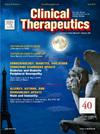短疗程氟喹诺酮与标准疗程氟喹诺酮治疗慢性阻塞性肺疾病急性加重期的疗效和安全性比较:双盲研究荟萃分析
IF 3.6
4区 医学
Q2 PHARMACOLOGY & PHARMACY
引用次数: 0
摘要
目的:本荟萃分析的目的是确定短疗程(≤5天)氟喹诺酮治疗是否与长疗程(7天)治疗慢性阻塞性肺疾病(COPD)急性加重患者同样有效。方法:检索PubMed、Embase、Cochrane library和Web of Science至2021年。有资格纳入的研究是抗生素干预的随机试验,涉及年龄在bb0 - 18岁、诊断为慢性阻塞性肺病急性加重、诊断时没有抗微生物药物、在2个不同疗程中接受氟喹诺酮类药物治疗的成年患者。分析的主要结局是意向治疗的早期随访的临床治愈率。结果:9项研究共3951例患者符合纳入标准。研究的方法学质量很高或非常高,约77%的研究Jadad得分至少为4分。结论:短疗程的氟喹诺酮类药物在治疗慢性阻塞性肺病急性加重患者方面被证明与常规疗程一样有效且更安全。鼓励进一步的研究来阐明接受短疗程喹诺酮类药物与常规疗程(NCT05380375)患者的长期结果。本文章由计算机程序翻译,如有差异,请以英文原文为准。
Comparative Efficacy and Safety of Short- Versus Standard-course Fluoroquinolone Treatment in Acute Exacerbations of Chronic Obstructive Pulmonary Disease: A Meta-analysis of Double-blind Studies
Purpose
The objective of this meta-analysis is to determine whether a short course (≤5 days) of fluoroquinolone treatment is as effective as a long course (7 days) in the treatment of patients with an acute exacerbation of chronic obstructive pulmonary disease (COPD).
Methods
PubMed, Embase, Cochrane library, and Web of Science were searched to 2021. Studies considered eligible for inclusion were randomized trials of antibiotic intervention involving adult patients >18 years of age with a diagnosis of acute exacerbation of COPD, no antimicrobial at the time of the diagnosis and who received treatment with fluoroquinolones in 2 different course duration. The primary outcome analyzed was the clinical cure rate at early follow-up in an intention-to-treat.
Findings
Nine studies with a total of 3951 patients met the inclusion criteria. The methodological quality of the study was high or very high with >77% of the studies having a Jadad score of at least 4. At early (<21 days) and late follow-up, there was no significant difference in clinical cure between the short course of fluoroquinolones therapy and the conventional course (odds ratio [OR] = 1.00; 95% CI, 0.97–1.04; P = 0.82). Similar results were found for both antibiotic regimens regarding bacteriologic clearance (OR = 0.96; 95% CI, 0.75–1.22; P = 0.73). Short course was not inferior to the long course when using the same quinolone (OR = 1.00; 95% CI, 0.95–1.04; P = 0.73) and it had significantly reduced adverse effects (OR = 0.76; 95% CI, 0.64–0.89; P < 0.05).
Implications
A short course of fluoroquinolones proved to be as effective as and safer than conventional course in the treatment of patients diagnosed with acute exacerbation of COPD. Further research is encouraged to clarify the long-term outcomes in patients receiving short course of quinolones compared with the conventional course (NCT05380375).
求助全文
通过发布文献求助,成功后即可免费获取论文全文。
去求助
来源期刊

Clinical therapeutics
医学-药学
CiteScore
6.00
自引率
3.10%
发文量
154
审稿时长
9 weeks
期刊介绍:
Clinical Therapeutics provides peer-reviewed, rapid publication of recent developments in drug and other therapies as well as in diagnostics, pharmacoeconomics, health policy, treatment outcomes, and innovations in drug and biologics research. In addition Clinical Therapeutics features updates on specific topics collated by expert Topic Editors. Clinical Therapeutics is read by a large international audience of scientists and clinicians in a variety of research, academic, and clinical practice settings. Articles are indexed by all major biomedical abstracting databases.
 求助内容:
求助内容: 应助结果提醒方式:
应助结果提醒方式:


